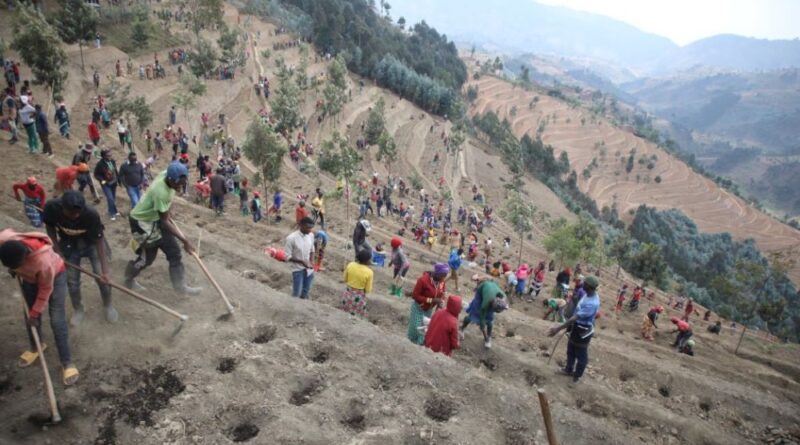Farmers in Ngororero reclaim productivity through terracing and reforestation
Farmers in the steep hills of Ngororero District have long struggled with poor yields due to soil erosion, but their harvests are now bouncing back thanks to terracing introduced this planting season.
One farmer remarked, “The soil was nearly depleted, but they made terraces, added fertilizer and lime, which will help restore its natural quality. We’re optimistic that erosion won’t affect us anymore, and our crops will remain secure.”
Another farmer added, “Ngororero often faces landslides, but these new trees will help reduce them, and the terraces combat erosion. We’ve now put a stop to landslides and will even have surplus crops to sell.”
The terracing and tree-planting activities span 11 sectors near the Gishwati-Mukura Forest and Lake Kivu in Rutsiro and Ngororero districts, aiming to last nearly two years.
To date, terracing has covered over 914 hectares, and more than 3.3 million trees have been planted. This work is part of the MuLaKiLa (Mukura and Lake Kivu Landscape Restoration Project), implemented by ARCOS Network in collaboration with DeforestAction.
Dr. Sam Kanyamibwa, director of the project, shared that in the next five years, they plan to work with local communities to plant 6 million trees and adopt climate-friendly farming practices to boost crop yields.
“We expect to have formed all community groups within five years,” Kanyamibwa explained. “The project aims to engage 40,000 residents across 1,500 groups, reforesting 21,000 hectares. We’re partnering with locals to support sustainable agriculture, environmentally conscious practices, and increased productivity for market-ready harvests.”
MuLaKiLa is part of a global effort toward sustainable livelihoods through environmental services and resource management, founded in 2020 by King Charles III. Stephen Halery, founder and CEO of DeforestAction, highlighted the project’s long-term commitment.
“The MuLaKiLa project will span 30 years,” Stephen said. “The first year focuses on planting, while the remaining years are dedicated to continuous monitoring to enhance climate resilience, preserve biodiversity, and promote community well-being.”
Patrick Uwihoreye, a Vice Mayor of Ngororero District in charge of economic development, urged residents to maintain the provided infrastructure.
“The current cost to terrace one hectare is 3.5 million Rwandan francs (about €3,500),” he said. “It’s crucial that residents understand the value of these resources and maximize their benefits.”
This project covers eight sectors in Rutsiro and six in Ngororero, with a budget of €56 million (over 80 billion Rwandan francs).

